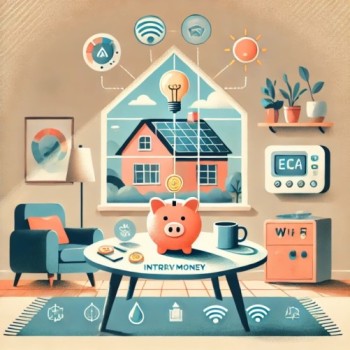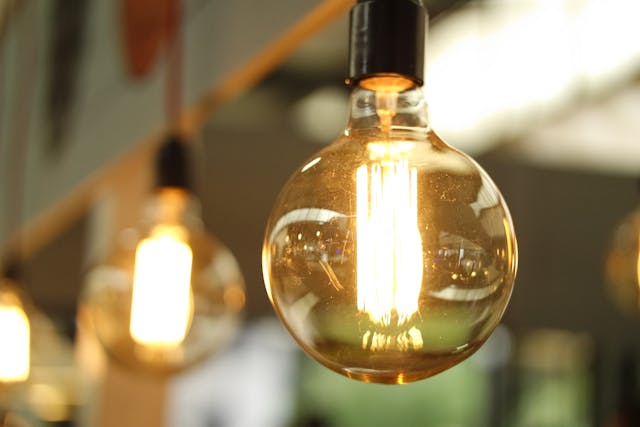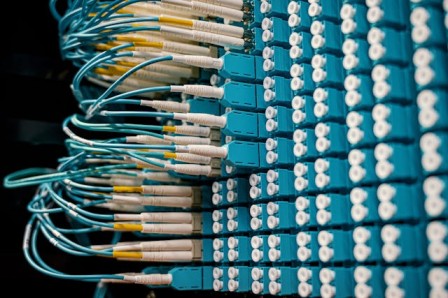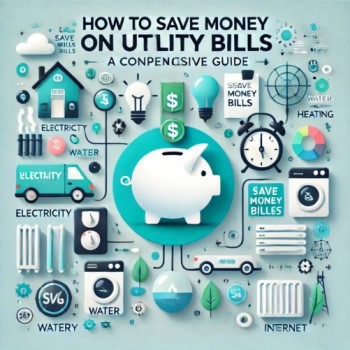How to Save Money on Utility Bills: For most homes, utility bills represent a sizeable monthly expenditure. These ongoing expenses, which range from heating and internet to water and electricity, may rapidly mount up and strain your budget. The good news is that you may save money and lower your electricity bills without compromising comfort if you plan ahead and use sensible tactics. We’ll go over practical advice in this extensive guide to help you successfully reduce your utility costs.

How to Interpret Your Utility Bills
It’s important to know what goes into your electricity bills before implementing any savings measures. Typical classifications consist of:
- Electricity: Electronics, appliances, and lighting.
- Water: Used for everyday tasks including cleaning, cooking, and bathing.
- Heating and cooling systems include insulation, air conditioners, and heating systems.
- Cable and Internet: TV bundles, streaming services, and data plans.
- Trash and Recycling: Charges for the removal of waste.
Finding places where you may save expenditures might be facilitated by carefully going over your utility bills.
Electricity: How to Reduce Your Bill and Save Energy
Frequently, the biggest expense on a utility bill is electricity. Here are some strategies to reduce how much power you use:

1. Invest in Energy-Saving Appliances
Contemporary appliances are made to operate with minimal energy use. When buying appliances like air conditioners, washing machines, and refrigerators, look for the Energy Star designation.
Pro Tip: By using less energy, energy-efficient appliances save money over time, even if they may initially cost more.
2. Make Use of LED Light Bulbs
LED lights can be used in place of conventional incandescent bulbs. LED lights last a lot longer and consume up to 75% less energy.
Action Step: Replace light bulbs first in high-traffic areas, such as the living room and kitchen.
3. When not in use, unplug electronics
Many gadgets use energy even when they are not in use; this is referred to as “phantom energy.”
Solution: Invest in smart plugs that can be operated remotely or use power strips to conveniently switch off many devices at once.
4. Adjust the Thermostat’s Settings
Even a small temperature change can result in substantial cost savings. Lower it while you’re sleeping or not around in the cold. Raise it a little in the summer.
Pro Tip: For automated settings, think about a smart or programmable thermostat.
5. Make Use of Natural Light
During the day, open your shades and drapes to lessen the need for artificial lighting. This little practice can brighten your house and save electricity.
6. Perform an Energy Assessment
To find inefficiencies in your house, a lot of utility providers provide free or inexpensive energy audits. These audits offer information on ways to save expenses and save energy.
Step to Take: Arrange for an energy audit to find untapped savings potential.
7. Make Use of Intelligent Power Strips
When a gadget is not in use, smart power strips automatically turn it off. This lessens the amount of energy wasted by standby electronics.
Pro Tip: Put them in places where a lot of gadgets are present, like your home office or entertainment centre.
Water: How to Save and Reduce Expenses
Conserving water reduces your water cost and benefits the environment. Here’s how:

8. Address leaks right away
Every day, lots of water might be wasted due to a leaky tap or a running toilet.
Action Step: Check for leaks in toilets, pipes, and faucets on a regular basis and fix them right away.
9. Install Fixtures with Low Flow
Low-flow faucets and shower heads use less water without sacrificing pressure.
Pro Tip: Installing water-efficient fixtures can result in rebates from many municipalities.
10. Make Showers Shorter
Every year, hundreds of gallons of water may be saved by cutting down on shower time by just a few minutes.
Action Step: Limit shower duration to five minutes by using a timer.
11. Make Good Use of the Dishwasher
Dishwashers only run when the load is full, yet they frequently consume less water than hand washing dishes.
Pro Tip: If there is an environment or energy-saving option, use it.
12. Collect Rainwater
Gather rainwater for outside applications like vehicle washing and plant watering, if allowed in your region.
Pro Tip: Purchase a rain barrel system as an action item.
13. Cut the Tap Off
When brushing your teeth or doing the dishes, don’t let the water run needlessly. Every day, turning off the tap may save litres of water.
Pro Tip: Encourage kids to pick up this behaviour as well.
14. Make Use of Greywater Systems
Greywater systems reuse water from showers, sinks, and washing machines for irrigation and other non-potable applications.
Action Step: Look into greywater system installation choices and local restrictions.
Effective Climate Control for Heating and Cooling
During severe weather, heating and cooling expenses may increase. Make use of these techniques to maintain a cosy and energy-efficient home:

15. Make Your House Insulated
Insulating your home properly keeps it cooler in the summer and stops heat loss in the winter.
Solution: Pay attention to spaces like windows, walls, and the attic. To stop drafts, weatherstrip doors and caulk cracks.
16. Take Care of HVAC Systems
The optimal operation of heating and cooling systems is ensured by routine maintenance.
Action Step: Arrange for yearly expert service and replace the air filters every one to three months.
17. Make Use of Ceiling Fans
By moving air around, ceiling fans help disperse warm air in the winter and lessen the demand for air conditioning in the summer.
Pro Tip: Turn your fan clockwise in the winter and anticlockwise in the summer.
18. Shut Down Unused Spaces
Energy is wasted when empty rooms are heated or cooled.
Solution: Shut off doors and vents in vacant spaces.
19. Make Use of Blinds and Curtains
Close the blinds in the summer to keep the heat out. In order to keep warm throughout the winter, open them during the day to let in sunshine and close them at night.
20. Set Up an Intelligent Thermostat
By learning your preferences and schedule, smart thermostats maximise the effectiveness of your heating and cooling systems.
Step to Take: Select a model that works with your smart home setup.
Internet and Cable: Reduce Expenses Without Compromise
Many homes overpay on cable and internet services. Here’s how to save money:

21. Services in Bundles
Discounts are frequently obtained by combining phone, cable, and internet services into a single bundle.
Pro Tip: Ask your provider for a lower price.
22. Trim the Wire
For a much lower price, streaming services like Netflix, Hulu, and Disney+ may take the place of traditional cable.
Step of Action: Pick a handful of providers that best suit your entertainment requirements.
23. Reduce the Speed of Your Internet
The majority of homes do not require the fastest internet packages. Switch to a plan that is more in line with your real consumption.
Pro Tip: Before making any adjustments, assess your existing use.
24. Distribute Subscriptions
Divide the cost of the streaming subscription among friends or family.
Step to Take: Verify that you are adhering to the platform’s sharing guidelines.
25. Steer clear of needless equipment rentals
Think about purchasing your own gear if your provider charges for renting a router or modem.
Pro Tip: Before buying, confirm compatibility.
26. Keep an eye on promotions
For new clients, service providers frequently provide discounted prices. Periodically check to see if you qualify for a better offer.
Step to Take: Be ready to change providers if needed.
Recycling and Trash: Reduce Waste Charges
Your garbage and recycling rates might be reduced by cutting less on waste. Here’s how:
27. Compost and Recycle
To cut down on the quantity of garbage you produce, separate recyclables and compost organic waste.
Pro Tip: Compost containers are provided for free or at a reduced cost in many localities.
28. Select Trash Bins That Are Smaller
Certain garbage services charge according to the size of the bin. If at all feasible, use a smaller container.
Step to Take: Examine your trash to see whether shrinking is practical.
29. Cut Down on Packaging Waste
Purchase in large quantities and pick goods with little to no packaging.
Pro Tip: When you go shopping, bring reusable containers and bags.
30. Steer clear of single-use items
For things like coffee cups, shopping bags, and water bottles, switch to reusable alternatives.
Action Step: To develop the habit, keep reusable objects close at hand.
General Advice for Lowering Utility Costs
All utility kinds can benefit from these extra tactics:

31. Keep an Eye on Your Use
Utilise apps or smart meters to monitor water and electricity usage.
Pro Tip: A lot of electricity suppliers offer free use monitoring programs.
32. Benefit from Off-Peak Prices
During off-peak hours, several utilities have reduced pricing.
Action Step: Plan energy-intensive chores like dish washing and laundry for these periods.
33. Teach Your Family
Make certain that everyone in your house is aware of and complies with energy-saving measures.
Pro Tip: Give youngsters an incentive for saving energy, making it into a game.
34. Make Use of Renewable Resources
Over time, wind energy systems or solar panels can significantly lower your electricity costs.
Step to Take: Look for tax credits or government incentives for installing renewable energy.
35. Examine Your Bills Frequently
Watch your utility invoices for mistakes or sudden increases.
Pro Tip: If something appears strange, get in touch with your provider right away.
36. Participate in Community Initiatives
Numerous charitable organisations and municipal governments provide initiatives to help citizens reduce their utility costs. These might include subsidies for energy-efficient improvements or help with weatherization.
The next step is to look into local initiatives.
37. Establish a Fund for Utility Savings
Put some of the money you save from lower utility costs into a special fund. This can assist with unforeseen costs or future energy efficiency initiatives.
Pro Tip: To make saving simple, set up automatic transfers.
In conclusion, it is possible to reduce utility bills.
Making wise decisions, breaking bad habits, and occasionally spending money on efficiency improvements are all necessary to lower electricity costs. You may reduce your monthly costs, help protect the environment, and gain more financial independence by putting these suggestions into practice.
Go to SavingSecret.in for further money-saving and budget-management advice. Take charge of your electricity expenses now to improve your financial future.
This comprehensive guide guarantees that you have useful and doable methods to reduce your utility costs. If you would like to add particular areas or extend further, please let me know!
Saving Money Tips for College Students: A Complete Overview

